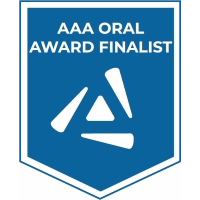Back
ANATOMY
Education
58.2 - Foundational Anatomy Knowledge Correlates with Success in Medical Anatomy
Saturday, April 2, 2022
3:15 PM – 3:30 PM
Room: 103 AB - Pennsylvania Convention Center
Megan Fagalde (Indiana University School of Medicine), Margaret McNulty (Indiana University School of Medicine)
-
Megan Fagalde
Presenting Author
Indiana University School of Medicine
Presenting Author(s)
Introduction: Despite being a foundational course in medical education, coursework in the anatomical sciences is not a pre-requisite for admission at most medical schools. This results in students possessing various levels of anatomy knowledge upon matriculation. In previous work, the authors found a significant positive correlation between incoming anatomy knowledge and performance in professional allied health anatomy coursework. Therefore, the goal of this study was to extend the previous work to determine if prior anatomy knowledge among first year medical (MD) students correlated with performance in a medical anatomy course.
Methods: In an IRB-approved study, first year MD students (n=378) enrolled in an integrated anatomy (gross anatomy, histology, and embryology) course in their first semester at Indiana University School of Medicine were administered a no-stakes 20-question pre-quiz at the start of the course. The pre-quiz covered basic gross anatomical concepts instructors expected students to know prior to starting the course. The course was broken into three blocks, each with an exam that included three components: a written exam, gross practical exam, and histology practical exam. Kendall’s tau correlation analyses compared pre-quiz scores with each individual exam component, total block exams (all three components combined), a cumulative anatomy-based NBME, and total course scores.
Results: Pre-quiz scores positively and significantly correlated with overall total course scores (lt;0.001). When the assessments were broken down further, pre-quiz scores significantly and positively correlated with all three total block exam scores (plt;0.01 for all). Positive and significant correlations were also found between pre-quiz scores and all three written exam scores (plt;0.010 for all), gross practical scores 1 and 3 (plt;0.001 for both), and histology practical scores 2 and 3 (plt;0.05 for both). Finally, positive and significant correlations were found between pre-quiz performance and NBME anatomy scores (plt;0.001).
Conclusion: This study found that MD students’ performance on a quiz testing incoming gross anatomy knowledge positively and significantly correlated with performance in an integrated medical gross anatomy course throughout the duration, expanding on previous work conducted in allied health professional student populations. This work provides further evidence that anatomy knowledge obtained prior to medical school (e.g. undergraduate coursework) may directly impact student performance in professional anatomy coursework. Future directions include analysis of anatomy experience among matriculating MD students and possible interventions for students identified as having a weak knowledge foundation.
Significance: These data identify a correlation between students’ incoming anatomy knowledge and performance in a medical integrated anatomy course. Considerations should be made when advising students who are applying to medical programs, including encouragement to complete undergraduate courses in the anatomical sciences. In addition, such assessments of incoming anatomy knowledge could allow instructors to identify students with a weak foundational anatomy knowledge early on, permitting intervention prior to possible remediation.
Methods: In an IRB-approved study, first year MD students (n=378) enrolled in an integrated anatomy (gross anatomy, histology, and embryology) course in their first semester at Indiana University School of Medicine were administered a no-stakes 20-question pre-quiz at the start of the course. The pre-quiz covered basic gross anatomical concepts instructors expected students to know prior to starting the course. The course was broken into three blocks, each with an exam that included three components: a written exam, gross practical exam, and histology practical exam. Kendall’s tau correlation analyses compared pre-quiz scores with each individual exam component, total block exams (all three components combined), a cumulative anatomy-based NBME, and total course scores.
Results: Pre-quiz scores positively and significantly correlated with overall total course scores (lt;0.001). When the assessments were broken down further, pre-quiz scores significantly and positively correlated with all three total block exam scores (plt;0.01 for all). Positive and significant correlations were also found between pre-quiz scores and all three written exam scores (plt;0.010 for all), gross practical scores 1 and 3 (plt;0.001 for both), and histology practical scores 2 and 3 (plt;0.05 for both). Finally, positive and significant correlations were found between pre-quiz performance and NBME anatomy scores (plt;0.001).
Conclusion: This study found that MD students’ performance on a quiz testing incoming gross anatomy knowledge positively and significantly correlated with performance in an integrated medical gross anatomy course throughout the duration, expanding on previous work conducted in allied health professional student populations. This work provides further evidence that anatomy knowledge obtained prior to medical school (e.g. undergraduate coursework) may directly impact student performance in professional anatomy coursework. Future directions include analysis of anatomy experience among matriculating MD students and possible interventions for students identified as having a weak knowledge foundation.
Significance: These data identify a correlation between students’ incoming anatomy knowledge and performance in a medical integrated anatomy course. Considerations should be made when advising students who are applying to medical programs, including encouragement to complete undergraduate courses in the anatomical sciences. In addition, such assessments of incoming anatomy knowledge could allow instructors to identify students with a weak foundational anatomy knowledge early on, permitting intervention prior to possible remediation.

